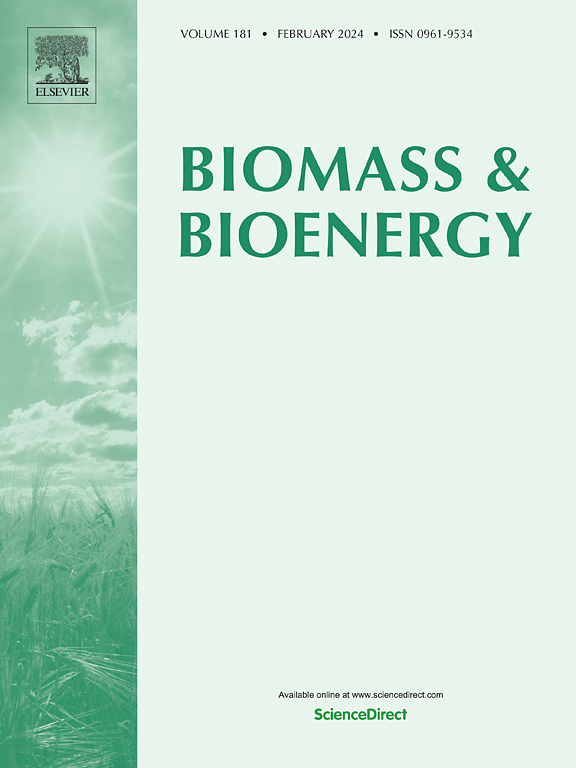A review of advanced techniques in hydrotreated vegetable oils production and life cycle analysis
IF 5.8
2区 生物学
Q1 AGRICULTURAL ENGINEERING
引用次数: 0
Abstract
Hydrotreated Vegetable Oils (HVO) are gaining prominence due to their low carbon dioxide emissions and compatibility with existing internal combustion engines. This study presents a comprehensive analysis of HVO production processes, emphasizing advanced hydrotreating techniques, the types of raw materials utilized, and the challenges inherent to each method. Additionally, this work reviews the life cycle analysis (LCA) of HVO, providing a comparative assessment of the environmental impacts across the entire value chain, from raw material production to final consumption and also provides a breakdown of the final production costs. The predominant production processes for HVO—namely hydrotreatment, deoxygenation, and isomerization of triglyceride-based biomass—are technologically well-established and widely adopted in the industry. HVO demonstrates a significant reduction in carbon dioxide emissions, ranging from 60 % to 95 % compared to conventional diesel, throughout its entire life cycle. As a result, the application of life cycle analysis methodologies has become increasingly prioritized by companies in this sector to identify additional environmental impacts across various phases of production, distribution, and utilization of this biofuel.
加氢处理植物油生产技术及生命周期分析综述
加氢处理植物油(HVO)因其低二氧化碳排放和与现有内燃机的兼容性而日益受到重视。本研究对HVO生产过程进行了全面分析,强调了先进的加氢处理技术、所使用的原材料类型以及每种方法固有的挑战。此外,本工作还回顾了HVO的生命周期分析(LCA),对从原材料生产到最终消费的整个价值链的环境影响进行了比较评估,并提供了最终生产成本的细目。hvo的主要生产工艺-即甘油三酯基生物质的加氢处理,脱氧和异构化-在技术上已经建立并在工业中广泛采用。与传统柴油相比,HVO在其整个生命周期内显著减少了60%至95%的二氧化碳排放量。因此,生命周期分析方法的应用越来越受到该领域公司的重视,以确定这种生物燃料在生产、分销和利用的各个阶段对环境的额外影响。
本文章由计算机程序翻译,如有差异,请以英文原文为准。
求助全文
约1分钟内获得全文
求助全文
来源期刊

Biomass & Bioenergy
工程技术-能源与燃料
CiteScore
11.50
自引率
3.30%
发文量
258
审稿时长
60 days
期刊介绍:
Biomass & Bioenergy is an international journal publishing original research papers and short communications, review articles and case studies on biological resources, chemical and biological processes, and biomass products for new renewable sources of energy and materials.
The scope of the journal extends to the environmental, management and economic aspects of biomass and bioenergy.
Key areas covered by the journal:
• Biomass: sources, energy crop production processes, genetic improvements, composition. Please note that research on these biomass subjects must be linked directly to bioenergy generation.
• Biological Residues: residues/rests from agricultural production, forestry and plantations (palm, sugar etc), processing industries, and municipal sources (MSW). Papers on the use of biomass residues through innovative processes/technological novelty and/or consideration of feedstock/system sustainability (or unsustainability) are welcomed. However waste treatment processes and pollution control or mitigation which are only tangentially related to bioenergy are not in the scope of the journal, as they are more suited to publications in the environmental arena. Papers that describe conventional waste streams (ie well described in existing literature) that do not empirically address ''new'' added value from the process are not suitable for submission to the journal.
• Bioenergy Processes: fermentations, thermochemical conversions, liquid and gaseous fuels, and petrochemical substitutes
• Bioenergy Utilization: direct combustion, gasification, electricity production, chemical processes, and by-product remediation
• Biomass and the Environment: carbon cycle, the net energy efficiency of bioenergy systems, assessment of sustainability, and biodiversity issues.
 求助内容:
求助内容: 应助结果提醒方式:
应助结果提醒方式:


